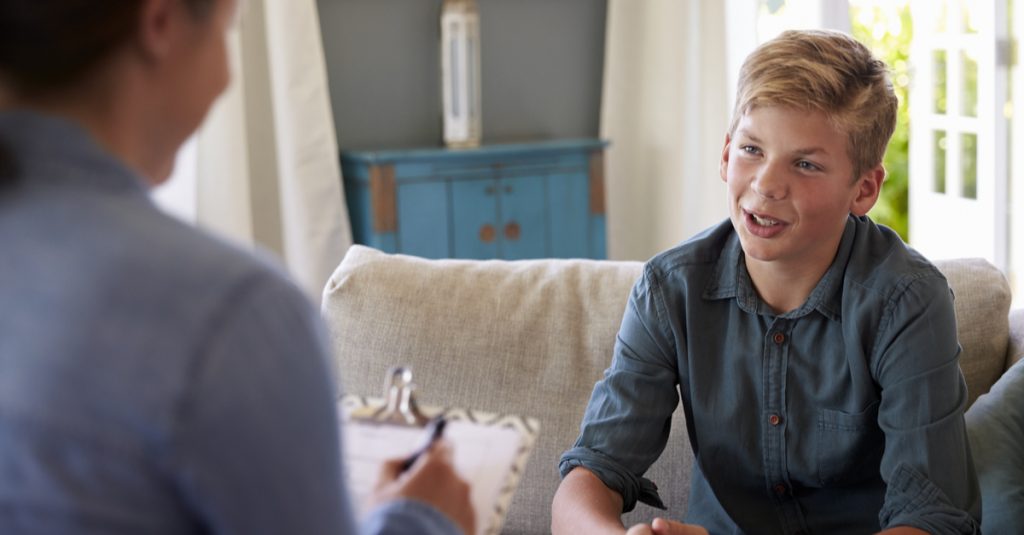Parenting a teenager is hard work and can be overwhelmingly frustrating. Long-gone is that sweet child you knew. Now, between the eye-rolls, resistance, and mood swings, it can seem like you and your teen are fighting a never-ending war. Rest assured, you are not alone. More importantly, support is available if you need it.
Why do teenagers rebel against their parents?
The teen years are a time of significant growth and change. During adolescence, teenagers begin learning and testing the independence needed for adulthood. Independence is a vital skill we all need to master to be successful as an adult. Independence allows us to survive on our own without the protection of our parents, a difficult yet exciting skill to learn.
Part of independence testing in adolescence includes gaining more control over the things they do each day. While washing the dishes on a Tuesday compared to a Friday may not seem to you like a reason to fight for independence, it can mean a lot to your teen. Perhaps they would rather do the dishes on a Tuesday to free up Friday night for time with their friends? Whether it be the dishes or a questionable fashion trend, playing an active role in decision making for even the smallest of tasks is a win for your teen’s growing sense of independence.
With independence can also come a newfound sense of righteousness. The all so common “It’s not fair!” echoed by teens around the world demonstrates their newly developing frontal lobe, equipped with more advanced fluid reasoning skills. More sound reasoning skills means a better chance of negotiating for more desirable outcomes. By this time, your teen has likely realised “Because I said so” is probably not the justified argument it was once touted to be and will fight it accordingly.
Part of growing up is testing limits, but it also brings with it the prospect of risky behavior.

Why is my Teenager’s Behaviour Worse at Home?
The teenage years see substantial and rapid brain development. A combination of genetics and environmental influences help to begin moulding the brain into its adult form. During this time of mass brain development, the family home can become a safe space for teens to experiment with an expanding social, emotional and cognitive skill set. Whilst essential, this can be a stressful time to navigate for both teens and their parents.
Paired with genetics, environmental experiences play a major role in brain development during adolescence. These experiences help the brain learn to achieve desired outcomes, or cope effectively with undesirable outcomes when faced with novel or abstract situations. Environmental influences on brain development are best explained in two main categories:
- Biological/ Physical Environment – Impact of the physical body and its experiences on brain development (e.g. Adequate nutrition providing chemical building blocks for the brain, puberty, or a decision directly leading to physical pain/discomfort or pleasure.)
- Social Environment – The impact of social interactions and their associated consequences on brain development (e.g. Social acceptance or rejection following expression of thoughts, emotion, identity, or beliefs.)
From these experiences, teens begin piecing together their sense of self, their view of the world and how they should interact with it.
The journey from being a child to being a young adult requires a great deal of learning. Learning new skills of any kind can be daunting, especially without support. The family home often acts as an ‘Experimental Lab’ for adolescent brains, providing needed comfort and familiarity for a safe learning environment. What is important to note here is this is completely unconscious behaviour. It is highly unlikely an adolescent will come home with the conscious intention of practising their logical reasoning skills in an argument with mum.
Instead, the learning process of the adolescent brain sees increased testing and learning in environments with reduced longstanding consequences. For example, saying the wrong thing or acting the wrong way in a school peer group could lead to significant and ongoing social rejection and isolation. Conversely, in most healthy home environments families will resolve or move past conflict much quicker with less enduring social consequences or judgments. For many, a reliable and consistent family unit is assumed, even in situations which may ignite conflict initially.
How to Understand Teenage Behaviour
Bad behaviour doesn’t necessarily infer mental illness. If your teen is testing your limits and pushing your buttons, chances are you are doing just fine. Your adolescent is exploring uncharted territories in their developing brain map thus, it’s a good indicator that you are a trusted person in their life. Although emotionally taxing at times, remember; this is normal behaviour for teens who trust their parents enough to be vulnerable whilst developing these life skills. More importantly, recognising this may provide a foundation to begin building a better understanding of and communication with your teen.

How do I Deal with my Teenager’s Attitude?
Reconceptualising your teen’s ‘attitude’ as a function of communication and a learning opportunity is the easiest and most helpful tip. All the advice and 10-step parenting systems in the world will be ineffective if the mentality that ‘your teen is just trying to make your life hard’ remains. Remember, we were all young once. Once settled with the concept of your teen as a super student of brain academy, we can work on improving communication. Arguably the most helpful tool to improve communication with your teen is co-regulation.
What is Co-Regulation and How can it Help me Communicate with My Teenager?
Co-regulation is a fancy word for a simple concept. Put simply, co-regulation is the notion that ‘emotions are contagious’. For example, meeting your teen’s anger with your own will likely perpetuate a cycle of anger and aggression. In comparison, displaying a calm facade and speaking in a softer voice can help bring your teen (or anyone for that matter!) down to the same level you are modelling through subconscious mirroring. Co-regulating in such a way opens the door for improved communication and de-escalation of conflict. Often referred to as ‘Flipping your Lid’, it can be difficult to access the brain’s language and reasoning abilities if more ‘primitive’ centres for emotion are heightened and in control. Co-regulation can help your teen move from a ‘flipped lid’ back to a state where they are better able to listen and communicate with you. The hard part here is first being able to self-regulate your own external reaction to your teen or the situation at hand. Although difficult, practice makes perfect! Or rather, practice makes 50% perfect, still better than 0.
How Should Parents Treat Their Teenagers?
No one can tell you how to parent or ‘treat’ your kid. You are the parent, you know them best and you know how you would like them to be raised. No one can change these things. However, on a more general level, approaching conversations with genuine curiosity can be helpful if you feel you are struggling to communicate with your teen. Genuine curiosity is a great tool for communication with teenagers. Applying this tool can help open communication barriers and shift the dynamic to a place where your teen feels heard and is also more willing to listen.

What does genuine curiosity look like?
Genuine curiosity comes in many forms and can be applied in many settings. As an example, let’s say your teen comes home in a bad mood. They give you only one-word answers and are aggressive in their tone. You ask what’s wrong only to be met with “Nothing.” or “You wouldn’t get it”. Prying further, your teen tells you their teacher is unfair to them, here’s where genuine curiosity comes in.
Sometimes we jump to conclusions without letting our teen get the full benefit of opening up to us. It can be easy in this situation to retort something along the lines of “What did you do wrong to make her yell at you?”. Though a valid question, this may bar any further positive communication. Demonstrating active listening with ‘minimal encouragers’ such as nodding, affirmative statements (e.g. “mhmm”, “OK”, etc.) and extending pauses after each reply (the more prolonged and awkward the better) can encourage your teen to give much more information and potentially lead to deeper discussions. Genuineness and tone are key here. Applying these tools in a demeaning or dismissive manner will likely be much less effective.
What can I do if I can’t handle my Teenager’s Behaviour?
While most teen defiance can be categorised as a type of ‘normal’, sometimes the behaviours our teens display may be more difficult to handle if we are ill-equipped or they are on the more extreme ends of the scale (e.g. depression and other mental illness). If you find yourself feeling helpless and worried about the ongoing wellbeing of your teen or family, there are many resources and services available to help.
What support does EAP offer for parents and teens?
Employee Assistance Programs (EAP) offer staff of organisations the opportunity to receive support from a practitioner paid for by the organisation. Immediate family members are usually eligible to receive support through an EAP. Types of support include:
- general counselling
- family therapy
- parenting or couples counselling
Specialised interventions, including;
- Cognitive behavioural therapy (CBT)
- Eye Movement Desensitisation and Reprocessing (EMDR)
- Behavioural Interventions; e.g. Anger management, Positive behavioural support.
Most EAP’s offer other types of support as well, for example, financial advice, mindfulness support, critical incident management support and redundancy support. Read our FAQs about EAP here.

How can EAP assist parents?
Living with young people is a challenging at times. It involves healthy doses of tolerance, a splash of self-restraint, a sprinkling of non-judgement and the ability to understand one or two-word “sentences”.
In a nutshell, an EAP practitioner will work with parents to develop a better understanding of how to co-exist with a young person. This is not to suggest that the therapist has all the answers. In fact, this is never the case. The foundation of a successful engagement with any parent is the acknowledgement that parents have the answers and that we therapists are there to unearth them.
The following is a common approach in working with parents and teens;
- Where there is concern about other factors that may be contributing to the behaviours of concern, a full understanding of these needs to be explored. This could include a referral to a Clinical Psychologist or GP for a mental health assessment.
- From there we would engage the family in a Behavioural Intervention including;
- Identify the underlying issues with their child (the function of the behaviour)
- Assess and validate parents’ knowledge and current strategies
- Educate and advise on different ways to support the young person
- Assist parents to develop and implement further strategies
- Follow-up on agreed milestones
- Tweak and modify strategies as appropriate
- Provide resources and regular updates
Should I seek EAP assistance?
If you feel that everything you try does not seem to have a positive impact, which in turn, leads you to become frustrated, angry or even experience feelings of despair, then why not seek out the support of an EAP practitioner? No harm no foul right?
If this is offered as part of your EAP, you should expect to be partnered with an experienced counsellor in the area of family therapy and behavioural intervention.
Here at Allos Australia, we are always on the search for stand out practitioners with diverse qualifications and experience, particularly in the area of behavioural support.
It is amazing how working with someone that has a good rapport and a good body of knowledge can assist parents to “unlock” strategies that make a significant difference.
What if my teen and I need more assistance than what EAP can provide?
Sometimes a comprehensive analysis of contributing factors is called for. In this case, we refer on to the family GP or Clinical Psychologist. This is an opportunity to gather more information about the young person and will assist the practitioner to develop better strategies and outcomes for the young person.
Final thoughts
EAP’s are in place to support staff and immediate family members. The most successful interventions are when the EAP is engaged as early as possible, so don’t hesitate.
Here at Allos Australia, we know that relationships are everything, so developing a workplace presence is extremely important when people are faced with the prospect of seeking support, whether it be for themselves or their child. To this end, we work very hard to break down the barriers of “traditional EAPs” which only react when there’s a crisis.
Rule of thumb
If you are not sure of the benefits of EAP – CALL
If you can’t seem to kick lingering worries – CALL
Are there issues in your life that prevent you from being happy? – CALL
Do you want to get better at self-managing – CALL

